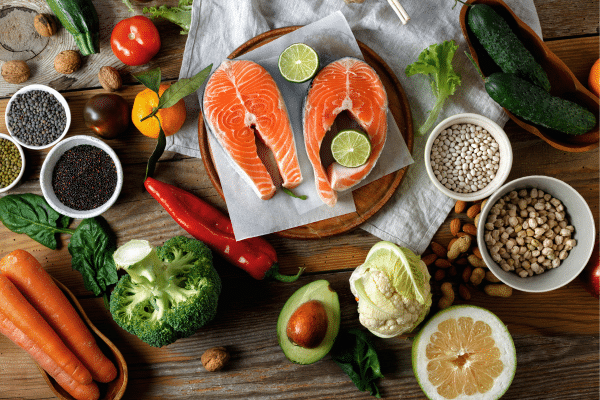Food cravings can be an overwhelming experience, dictating impulses that drive individuals to indulge in specific foods, often high in sugars or fats. These intense desires can derail efforts to maintain a healthy diet and lifestyle. Addressing this issue requires strategic actions and lifestyle adjustments aimed at reducing the frequency and intensity of cravings. This article delves into various methods proven effective in curbing these unruly desires, helping individuals stay on track with their health goals, enjoy a balanced diet, and foster an overall sense of wellness.
Contents
Eat Filling, Nutrient-Dense Foods

A diet rich in nutrient-dense foods plays a pivotal role in keeping food cravings at bay. Foods high in protein, fiber, and healthy fats are not only essential for overall health but also instrumental in promoting satiety. They slow down digestion, stabilize blood sugar levels, and provide sustained energy. Incorporating foods like lean meats, whole grains, legumes, fruits, and vegetables ensures a well-rounded intake of vital nutrients and minimizes the inclination to seek out less nutritious options.
In addition to curbing hunger, nutrient-dense foods offer a plethora of health benefits. They foster optimal bodily function, enhancing mental and physical performance. Choices like nuts, seeds, avocados, and leafy greens provide essential vitamins, minerals, and antioxidants that bolster the immune system, improve cognitive function, and mitigate the risk of chronic diseases. Thus, a diet abundant in these foods not only diminishes cravings but also propels overall wellness.
Plan Your Meals

Consistency and preparation are crucial in the journey to overcome food cravings. By planning meals ahead of time, individuals can ensure a balanced and varied diet, making it easier to avoid succumbing to whims of intense desires for specific foods. Organizing weekly menus, preparing meals in advance, and having ready-to-eat healthy options accessible diminishes reliance on unhealthy, convenient options that are often sought out in moments of intense hunger.
Another advantage of meal planning is the empowerment it affords in making informed, deliberate choices. When meals are planned, there is a reduced tendency to opt for quick, often unhealthy options. It facilitates a balanced intake of proteins, carbs, and fats, promoting satiety and nutritional adequacy. Knowing what and when to eat helps in maintaining a steady energy level, mitigating the onset of cravings often exacerbated by energy lows.
Drink Plenty Of Water

Hydration is an often overlooked but critical factor in managing food cravings. The body sometimes confuses signals of thirst for hunger, leading to unnecessary eating. By consuming adequate amounts of water throughout the day, this mix-up is less likely to occur. Moreover, drinking water before meals can enhance the feeling of fullness, aiding in portion control and reducing the intake of excessive calories.
Besides preventing mistaken hunger, adequate hydration supports overall bodily functions, including metabolism and energy production. Water aids digestion, nutrient absorption, and the elimination of waste products, promoting overall wellness. A well-hydrated body ensures that all systems operate optimally, reducing the likelihood of cravings that can arise from nutritional imbalances or deficiencies.
Manage Stress Levels

Stress is intrinsically linked to an increase in food cravings, particularly those centered around sugary, fatty, or salty foods. Hormones like cortisol surge during stressful periods, prompting a craving for comfort foods that momentarily boost mood and energy. Finding effective ways to manage stress is essential, such as engaging in physical activities, pursuing hobbies, or seeking social support, to curb the escalation of cravings linked to emotional upheavals.
Physical activity, in particular, is a powerful antidote to stress. It elevates mood by increasing the production of endorphins, the body’s natural mood lifters. Additionally, activities like reading, gardening, or even taking a leisurely walk can be potent tools for stress reduction. By managing stress effectively, the cycle of emotional eating and cravings can be significantly interrupted, fostering a more balanced and healthy relationship with food.
Practice Mindful Eating

Mindful eating involves paying full attention to the experience of eating, from the flavors and textures of food to the signals of hunger and fullness. This practice encourages a more intentional and thoughtful approach to eating, discouraging impulsive or emotional decisions. When individuals eat mindfully, they’re more likely to make nutritious choices, appreciate their meals, and find satisfaction in smaller portions.
Implementing mindful eating can be achieved by eliminating distractions during meals, such as turning off the TV or putting away smartphones. It’s about savoring each bite, eating slowly, and paying attention to how the body responds. In this mindful state, recognizing and respecting the body’s hunger and fullness signals becomes second nature, paving the way for a balanced diet and reduced food cravings.
Don’t Go To the Supermarket Hungry

The experience of shopping while hungry can lead to an avalanche of impulsive decisions, filling the shopping cart with unhealthy, high-calorie foods. This behavior is not just detrimental to health but also to the wallet. Being satiated before stepping into the store ensures that choices are made rationally, focusing on nutrient-dense foods that align with health goals rather than being lured by the immediate gratification of sugary or fatty foods.
Creating and adhering to a shopping list is another effective strategy to avoid impulsive purchases. A well-thought-out list, made when not under the influence of cravings, ensures that only necessary and healthy items make it to the checkout. This preparation aids in steering clear of the allure of unhealthy options, making room for ingredients that contribute to a balanced and varied diet.
Get Plenty Of Sleep

Adequate sleep is intricately connected to overall health and the management of food cravings. Lack of sleep disrupts hormonal balance, leading to an increase in ghrelin, the hunger hormone, and a decrease in leptin, the hormone that signals fullness. This imbalance often results in an increased appetite and specific cravings for high-carb and sugary foods. Ensuring a consistent sleep schedule and improving sleep quality can effectively mitigate these effects, promoting hormonal balance and reduced cravings.
The environment in which one sleeps can significantly impact sleep quality. A room that is dark, quiet, and cool is conducive to restful sleep. Additionally, establishing a pre-sleep routine that includes activities like reading or taking a warm bath can signal the body that it’s time to wind down. Avoiding caffeine and heavy meals before bedtime also contributes to better sleep and, consequently, a reduction in unwarranted food cravings.
The Bottom Line
Conquering food cravings entails a multifaceted approach that incorporates dietary, psychological, and lifestyle strategies. Prioritizing nutrient-dense foods, hydration, and meal planning establishes a foundation of wellness and satiety. Concurrently, managing stress, practicing mindful eating, and ensuring quality sleep further reinforce one’s ability to withstand the pull of cravings. The interplay of these elements fosters a resilient, balanced state of being, where cravings are acknowledged but not surrendered to, paving the path for a healthier, more harmonious relationship with food and self.


